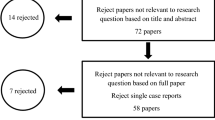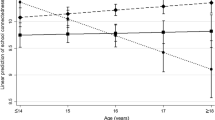Abstract
Purpose
The school environment may positively influence student health behaviours and learning. This study aimed to investigate the association between cities' quality of education and adolescent students' oral health-related behaviours.
Methods
Cross-sectional study using data of the 2015 Brazilian National Adolescent School-Based Health Survey and other public databases. The sample was composed of adolescents (N = 23,674) from public schools of the 27 Brazilian state capitals. Outcomes were four oral health-related behaviours: toothbrushing, sweets and soft-drink consumption, and dental visits. The explanatory variable was the cities' quality of education, measured by the Brazilian Basic Education Development Index. Covariates were individual (sociodemographic) and contextual (socioeconomic, oral health coverage and oral health-promoting schools). Multilevel logistic regression was performed considering two levels: individual (adolescents) and contextual (city).
Results
The prevalence of the outcomes were: low daily toothbrushing frequency 6.7% (95% CI 6.0–7.4); high weekly sweets consumption 41.5% (95% CI 40.3–42.7); high weekly soft-drink consumption 28.5% (95% CI 27.2–29.9); and low frequency of annual dental visits 31.2% (95% CI 30.1–32.3). In the adjusted models, cities whose schools had higher scores of education quality were more likely to have students with low toothbrushing frequency and high frequency of sweets consumption.
Conclusion
The cities' quality of education was associated with unhealthy oral health-related behaviours, particularly the frequency of toothbrushing and sweets consumption. Therefore, appropriate health promotion strategies as well as high-quality education are needed in schools.
Similar content being viewed by others
Data availability
Not applicable.
Code availability
Not applicable.
References
Anttila J, Tolvanen M, Kankaanpää R, Lahti S. Social gradient in intermediary determinants of oral health at school level in Finland. Community Dent Health. 2018;35(2):75–80. https://doi.org/10.1922/CDH_4127Anttila07.
Bastos JL, Boing AF, Peres KG, et al. Periodontal outcomes and social, racial and gender inequalities in Brazil: a systematic review of the literature between 1999 and 2008. Cad Saude Publica. 2011;27(Suppl 2):S141–53. https://doi.org/10.1590/s0102-311x2011001400003.
Bradley BJ, Greene AC. Do health and education agencies in the United States share responsibility for academic achievement and health? A review of 25 years of evidence about the relationship of adolescents’ academic achievement and health behaviors. J Adolesc Health. 2013;52:523–32. https://doi.org/10.1016/j.jadohealth.2013.01.008.
Brazilian Institute of Geography and Statistics. Pesquisa nacional de saúde do escolar (PeNSE): 2015; 2016. https://biblioteca.ibge.gov.br/visualizacao/livros/liv97870.pdf. Accessed 11 Sep 2019.
Brazilian Ministry of Health. Saúde na escola (Cadernos de Atenção Básica 24); 2009. https://bvsms.saude.gov.br/bvs/publicacoes/cadernos_atencao_basica_24.pdf. Accessed 16 Sep 2019.
Brazilian Ministry of Health. Datasus. Índice de Gini da renda domiciliar per capita; 2017a. http://www2.datasus.gov.br/DATASUS/index.php?area=0206&id=8065372&VObj=http://tabnet.datasus.gov.br/cgi/ibge/censo/cnv/gini. Accessed 11 Sep 2019.
Brazilian Ministry of Health. Histórico de Cobertura por competência e unidade geográfica; 2017b. https://egestorab.saude.gov.br/paginas/acessoPublico/relatorios/relHistoricoCobertura.xhtml. Accessed 15 Jun 2019.
Costa SM, Martins CC, Pinto M, et al. Socioeconomic factors and caries in people between 19 and 60 years of age: an update of a systematic review and meta-analysis of observational studies. Int J Environ Res Public Health. 2018;15(8):1775. https://doi.org/10.3390/ijerph15081775.
Cutler DM, Lleras-Muney A. Education and health: insights from international comparisons (No. w17738). National Bureau of Economic Research; 2012. https://doi.org/10.3386/w17738.
Freire MCM, Jordão LMR, Malta DC, et al. Socioeconomic inequalities and changes in oral health behaviors among Brazilian adolescents from 2009 to 2012. Rev Saude Publica. 2015;49:50. https://doi.org/10.1590/S0034-8910.2015049005562.
Freire MCM, Nery NG, Jordão LMR, Abreu M. Individual and contextual determinants of dental pain in adolescents: evidence from a national survey. Oral Dis. 2019;25(5):1384–93. https://doi.org/10.1111/odi.13100.
Ghorbani Z, Peres KG. Is the association between socioeconomic status and nonreplaced extracted teeth mediated by dental care behaviours in adults? Community Dent Oral Epidemiol. 2015;43(6):532–9. https://doi.org/10.1111/cdoe.12178.
Gonçalves MM, Leles CR, Freire MCM. Associations between caries among children and household sugar procurement, exposure to fluoridated water and socioeconomic indicators in the Brazilian capital cities. Int J Dent. 2013. https://doi.org/10.1155/2013/492790.
Jordão LMR, Malta DC, Freire MCM. Simultaneous oral health risk behaviors among adolescents: evidence from the National School-based Student Health Survey. Rev Bras Epidemiol. 2018;21(suppl 1): e180019. https://doi.org/10.1590/1980-549720180019.supl.1.
Kaewkamnerdpong I, Krisdapong S. The associations of school oral health-related environments with oral health behaviours and dental caries in children. Caries Res. 2018;52(1–2):166–75. https://doi.org/10.1159/000485747.
Kwan SY, Petersen PE, Pine CM, Borutta A. Health-promoting schools: an opportunity for oral health promotion. Bull World Health Organ. 2005;83(9):677–85
Linting M, Meulman JJ, Groenen PJ, van der Koojj AJ. Nonlinear principal components analysis: introduction and application. Psychol Methods. 2007;12(3):336–58. https://doi.org/10.1037/1082-989X.12.3.336.
Machry RV, Knorst JK, Tomazoni F, Ardenghi TM. School environment and individual factors influence oral health related quality of life in Brazilian children. Braz Oral Res. 2018;32: e63. https://doi.org/10.1590/1807-3107bor-2018.vol32.0063.
Marmot M. Social determinants of health inequalities. Lancet. 2005;365(9464):1099–104. https://doi.org/10.1016/S0140-6736(05)71146-6.
Moysés ST, Moysés SJ, Watt RG, Sheiham A. Associations between health promoting schools’ policies and indicators of oral health in Brazil. Health Promot Int. 2003;18(3):209–18. https://doi.org/10.1093/heapro/dag016.
National Institute of Studies and Educational Research. Resultados do IDEB. Municípios. Ensino Fundamental Regular-Anos Finais; 2016. http://portal.inep.gov.br/web/guest/educacao-basica/ideb/resultados. Accessed 13 Nov 2016.
Nery NG, Jordão LMR, Freire MCM. School environment and oral health promotion: the National Survey of School Health (PeNSE). Rev Saude Publ. 2019;53:93. https://doi.org/10.11606/s1518-8787.2019053001376.
Oliveira MM, Campos MO, Andreazzi M, Malta DC. Characteristics of the National Adolescent School-based Health Survey—PeNSE, Brazil. Epidemiol Serv Saude. 2017;26(3):605–16. https://doi.org/10.5123/S1679-49742017000300017.
Quezada-Conde MDC, Alvarez-Velasco PL, Lopez EF, et al. Influence of school environment on occurrence of traumatic dental injuries in 12 years old children. Dent Traumatol. 2020;36(5):510–7. https://doi.org/10.1111/edt.12559.
Schulz M, Kunst AE, Brockmann H. High educational attainment moderates the association between dental health-care supply and utilization in Europe. Eur J Oral Sci. 2016;124(1):52–61. https://doi.org/10.1111/eos.12237.
Sheiham A, James WP. A new understanding of the relationship between sugars, dental caries and fluoride use: implications for limits on sugars consumption. Public Health Nutr. 2014;17(10):2176–84. https://doi.org/10.1017/S136898001400113X.
Snijders TAB, Bosker RJ. Multilevel analysis: an introduction to basic and advanced multilevel modeling. 2nd ed. Los Angeles: SAGE; 2012.
United Nations Development Program. Atlas do Desenvolvimento Humano no Brasil. Atlas dos Municípios; 2013. http://www.atlasbrasil.org.br/2013/pt/download/. Accessed 11 Sep 2018.
United Nations Educational, Scientific and Cultural Organization. Education for all: the quality imperative; 2004. https://www.right-to-education.org/sites/right-to-education.org/files/resource-attachments/EFA_GMR_Quality_Imperative_2005_en.pdf. Accessed 16 Apr 2020.
Vano M, Gennai S, Karapetsa D, et al. The influence of educational level and oral hygiene behaviours on DMFT index and CPITN index in an adult Italian population: an epidemiological study. Int J Dent Hyg. 2015;13(2):151–7. https://doi.org/10.1111/idh.12098.
Viner RM, Ozer EM, Denny S, et al. Adolescence and the social determinants of health. Lancet. 2012;379:1641–52. https://doi.org/10.1016/s0140-6736(12)60149-4.
Watt RG, Sheiham A. Integrating the common risk factor approach into a social determinants framework. Community Dent Oral Epidemiol. 2012;40(4):289–96. https://doi.org/10.1111/j.1600-0528.2012.00680.x.
World Health Organization. Education: shared interests in well-being and development. (Social determinants of health sectoral briefing series, 2); 2011. https://apps.who.int/iris/bitstream/handle/10665/44737/9789241502498_eng.pdf;jsessionid=C299B7F0976A0027AE914AEA0BC01240?sequence=1. Accessed 16 Sep 2019.
Acknowledgements
The authors would like to acknowledge the Coordenação de Aperfeiçoamento de Pessoal de Nível Superior (CAPES) and the Fundação de Amparo à Pesquisa do Estado de Goiás (FAPEG).
Funding
This work was supported by the Coordenação de Aperfeiçoamento de Pessoal de Nível Superior, Brasil (CAPES) [Finance Code 001]; and the Fundação de Amparo à Pesquisa do Estado de Goiás (FAPEG) for the doctoral scholarship [Process: 201610267000825 – Edital 3/2016].
Author information
Authors and Affiliations
Contributions
NGN wrote the research project, carried out the data analysis, contributed to interpretation of data and drafted the manuscript. LMRJ contributed to interpretation of data and critically reviewed the manuscript. MHNGA carried out the data analysis, contributed to interpretation of data and critically reviewed the manuscript. MCMF conceived the study, supervised the research project, contributed to interpretation of data and drafted the manuscript. All authors approved the final version to be published.
Corresponding author
Ethics declarations
Conflict of interest
The authors declare that they have no conflict of interest.
Ethical approval
The 2015 PeNSE project was approved by the National Research Ethics Commission (Report Nº. 1006.467/2015).
Additional information
Publisher's Note
Springer Nature remains neutral with regard to jurisdictional claims in published maps and institutional affiliations.
Rights and permissions
About this article
Cite this article
Nery, N.G., Jordão, L.M.R., de Abreu, M.H.N.G. et al. Quality of education and adolescents’ oral health-related behaviours: a multilevel analysis. Eur Arch Paediatr Dent 23, 547–556 (2022). https://doi.org/10.1007/s40368-022-00700-2
Received:
Accepted:
Published:
Issue Date:
DOI: https://doi.org/10.1007/s40368-022-00700-2




